The contribution and achievements of pathology and laboratory medicine services that address global health challenges and improve the health outcomes of global communities have been recognised and celebrated by pathology and laboratory medicine institutions worldwide on International Pathology Day for over a decade.
Replay the the talks and roundtable discussions from conferences we have held in celebration of the day over the last 4 years.
IPD 2024 - talks and the round table

1
The keynote talk at our virtual conference for International Pathology Day in 2024 saw Professor Dame Sally Davies, UK’s Special Envoy on Antimicrobial Resistance in conversation with Dr Noha Elsakka OBE, Vice President for Communication
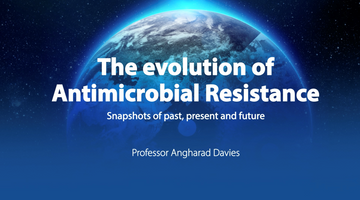
2
The second talk at our virtual conference for International Pathology Day in 2024, delivered by Professor Angharad Davies RCPath Clinical Director of Publishing and Engagement.
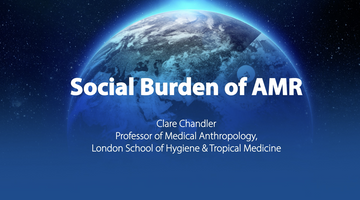
3
The third talk to at our virtual conference for International Pathology Day in 2024 delivered by Professor Clare Chandler, Medical Anthropologist at the London School of Hygiene and Tropical Medicine.
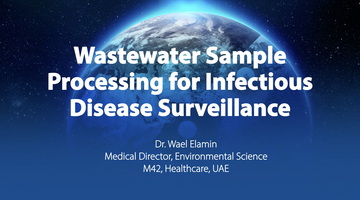
4
The fourth talk at our virtual conference International Pathology Day 2024, delivered by Dr Wael F Elamin MBBS, BSc, MSc, MD, FRCP, FRCPath, Medical Director, M42, Abu Dhabi, UAE
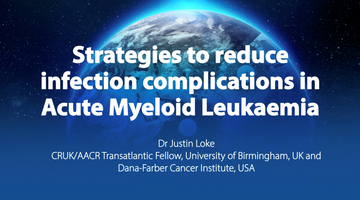
5
The fifth talk at our virtual conference for International Pathology Day in 2024 delivered by Dr Justin Loke CRUK/AACR Transatlantic Fellow, University of Birmingham, UK and Dana-Farber Cancer Institute, USA
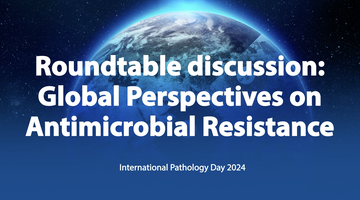
6
The roundtable discussion, chaired by College President Dr Bernie Croal, focused on global perspectives on antimicrobial resistance (AMR) drawing inspiration from the six-part webinar series hosted by the International Team last summer. Professor Samuel Taiwo, Professor and Consultant Clinical Microbiologist, Ladoke Akintola University of Technology (LAUTECH), Ogbomoso, Nigeria, Professor Margaret IP Chairman and Clinical Professor, Faculty of Medicine, Chinese University of Hong Kong, Professor Daniel Thirion Full Clinical Professor, Pharmacist, Université de Montréal, Montreal, Canada and Mc
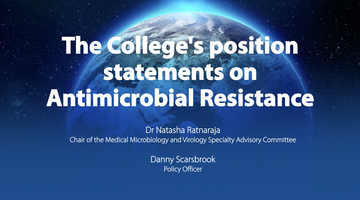
7
The lunchtime session at our virtual conference for International Pathology Day in 2024 was co-presented by Dr Natasha Ratnaraja, Chair of the Medical Microbiology and Medical Virology Specialty Advisory Committee, RCPath, Consultant in Infection, University Hospitals Coventry & Warwickshire and Danny Scarsbrook, College Policy Officer.
IPD 2023 - talks and the round table

Climate crisis is a health crisis
This presentation demonstrates how climate change intersects with a range of other health threats with significant potential to generate and compound complex health security

Climate change and the expanding range of dengue fever: A scientific analysis
This session comprehensively examined the tangible impact of climate change on the geographical distribution of dengue fever. With a focus on empirical evidence and epidemiological data.

Climate change and its impact on healthcare in India
The focus of this session was on the impact of climate change caused by global warming, its effect on the prevalence of diseases in tropical climates and the resulting challenges for blood transfusion services.

Applying sustainability principles in pathology practice
This talk explores how sustainability is the balance between the environment and the economy. Our changing climate has severe implications for public and planetary health and how as healthcare professionals, we have a responsibility to consider the way we practise and try to reduce any negative impacts of our practice.

Roundtable discussion: Planetary health
The roundtable focuses on the topic of planetary health and what can be done to encourage evidence-based environmentally sustainable policies to promote human health, wellbeing and prosperity. The discussion explored food security and nutrition risks, antimicrobial resistance and the challenges posed by the climate change for world populations.

College’s net zero strategy and carbon reduction roadmap project
This presentation explains more about the College’s strategy to reduce carbon use across our operations, which will eventually lead to achieving net zero.
2022 International Pathology Day Hybrid Conference

Keynote speaker, Dr Michael Ryan, in Conversation with the College President
Dr Mike Ryan, Executive Director of the WHO Health Emergencies Programme, engages in a dialogue on the importance of pathologists in outbreak response, including management of Ebola virus disease, COVID-19 and monkeypox. He will also discuss areas where further research, development and collaboration is needed.

Secondary bacterial and fungal infections: the impact of COVID-19
India is diverse in culture and heritage as well as the facilities there are for diagnosing infectious diseases. Patients in the first and second wave of the COVID-19 pandemic have been administered high doses of steroids and other immunosuppressive agents. This increases immunosuppression in the patient and the propensity to suffer from secondary infections, Dr Ranganathan N Iyer presents data from Indian centres who have experience in dealing with the diagnosis and outcome analysis of secondary bacterial and fungal infections in COVID-19 patients.

THET and the global health partnership community
Mr Richard Skone-James and Dr Jean O’Driscoll deliver an inspiring talk about the vision The Tropical Heath Education Trust (THET) has of a world where everyone has access to healthcare. They achieve this by training and educating health workers in Africa and Asia, working in partnership with organisations and volunteers from across the UK. Highlighting some of the projects they have worked on over the last year, including a collaboration with the Ghana College of Physicians and Surgeons in Ghana also supported RCPath's International Team.

One Health, many labs
Mr Russell Dacombe discusses some of the issues affecting laboratory diagnosis and surveillance of Antimicrobial Resistance in lower-middle-income countries. Focusing on how laboratories are critical to efforts to tackle global health challenges including antimicrobial resistance (AMR). Without accurate and timely data from laboratories the scale of AMR within populations is impossible to quantify. However basic bacteriology has been neglected in many LMIC settings owing to a focus on other important issues such as tuberculosis, malaria and HIV.

International activities at the College in a changing world – past, present and future
The roundtable discussion revisits the College’s international work and projects, both past and present, that have successfully built capacity in laboratories, assisted with continued professional development and improved quality assurance systems. This includes prior to the establishment of the College’s International team. Looking to the future, College fellows who have made a significant contribution to the international activities of the College will also consider how the College and the global pathology community will need to evolve to meet the ever-changing needs.
2021 International Pathology Day Virtual Conference

The Lancet Commission on Diagnostics
This talk discusses the findings of The Lancet Commission on Diagnostics. This major work of a global multidisciplinary team of twenty-five commissioners from 16 countries were commissioned to examine the shared challenges of pathology and laboratory medicine (PALM) and digital imaging (DI) services.

Practicing ‘deep medicine’ in ‘smart hospitals
Starting at the title of this talk Dr Tbakhi, gets us in deep in thought, about how ways of working and the environment in which a healthcare professional will operate in years to come is likely to be.

AI for Pathology
Professor Nasir Rajpoot Professor of Computational Pathology at the Computer Science department of the University of Warwick presents the work of his PHD students, which is an intriguing exploration, into how with an increasing number of NHS pathology labs being digitised in the UK, there is an explosion in the amount of pathology image data with linked clinical outcomes.

The roundtable "Can digital pathology break down international borders?"
The roundtable panel discuss the need to leverage the power of digital pathology to establish practical solutions that will positively impact global health for everyone.

One-episode podcast style interview with Associate Professor Clare Verrill and guest Dr Yuchun Ding, founder of X-WOW
Associate Professor Clare Verrill and guest Dr Yuchun Ding, founder of X-WOW, discuss how X-WOW began its mission, the importance of education and raising public awareness about the essential role of pathology in healthcare services.

Demonstration of the College’s upcoming Pathology Portal
Professor Jo Martin shows how technology will be used to enhance learning and how the platform aims to incorporate the ability to host and view whole slide imaging (WSI) over the world wide web (virtual microscopy) to enable pathology tissue samples to be annotated and viewed as part of learning sets, mapped to the relevant curricula of the College, and hosted and maintained within the system.
2020 International Pathology Day Virtual Conference

How early testing contributed to a robust pandemic response in Germany (and saved the Bundesliga along the way…)
Hear about how for all laboratories, priority testing necessarily focused on people who were symptomatic, as well as part of contact-tracing programs, and at-risk patients and health and social care staff, healthcare workers and residential care providers. A small number of operators, found themselves in ‘exotic’ projects, such as the design of a hygiene and diagnostics concept for the German Bundesliga, which ultimately became the first professional sports league in the Western world to resume regular matches (closely followed by the Premier League).

Serology Testing for MERS and SARS-COV2 Infections, Professor Ali Hajeer, Laboratory Director, King Abdulaziz Medical City
This presentation, reviews knowledge of serology testing for both SARS CoV-2 and MERS-CoV, and classes of antigen and antibody used in serology assays in 2020. It examines the role of serology in pandemics of coronavirus origin and asks whether serology has a part to play in ‘immunity passports’. Among other questions, it is also asked how long do antibodies to betacoronaviruses usually last and is there a role for rapid antibody testing in the clinical setting?

The South African perspective on Covid-19: developing new diagnostic approaches
This talk delivered by Professor Tahir Pillay, discusses one approach that was taken in South Africa in 2020 to use nanobodies to develop both biosensors and rapid lateral flow immunoassays. Single domain antibodies (“nanobodies”), which have the potential to revolutionise diagnostic testing. Their size, stability and robustness make them ideal for gene manipulation and alteration in the laboratory, and production costs are low.

Endemic pathogens and international research projects during a pandemic: Toxoplasma gondii and international research project TOXOSOURCES as an example
Dr Pikka Jokelainen and Dr Martha Betson discuss ‘TOXOSOURCES – Toxoplasma gondii sources quantified’ a 2.5-year (2020–2022) Joint Research Project of the One Health European Joint Programme (One Health EJP), with a focus on T. gondii at the interface between humans, animals, food and the environment. The TOXOSOURCES Consortium, comprising 20 One Health EJP partners across Europe and several external partners.

The roundtable: Why international knowledge sharing is a winner
The roundtable panel discuss the importance of international information exchange – especially in a pandemic – and how screening, diagnosis, treatment selection, and health monitoring differ between regions. Against the setting of COVID-19, it is more important than ever not to place boundaries on our ability to learn from one another.
